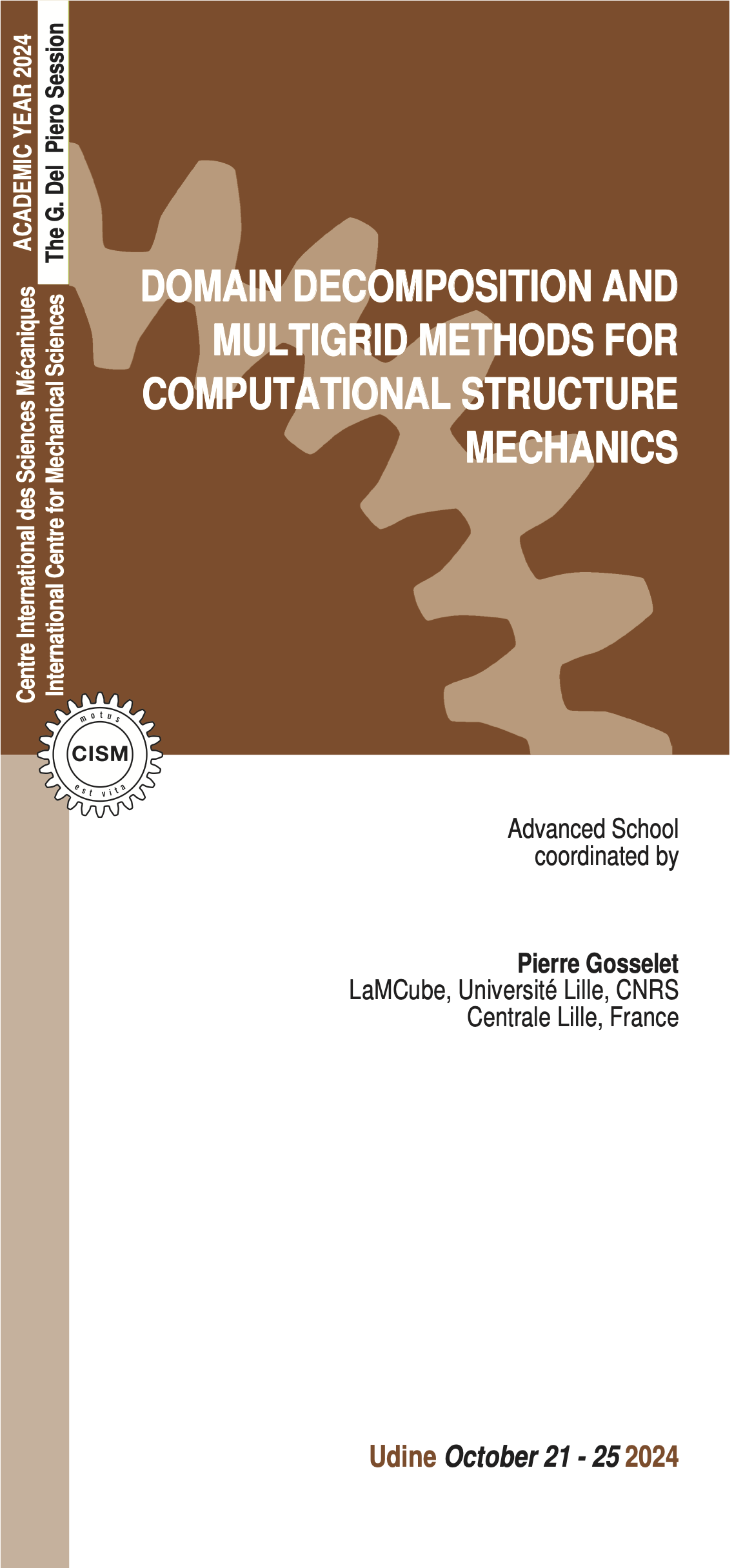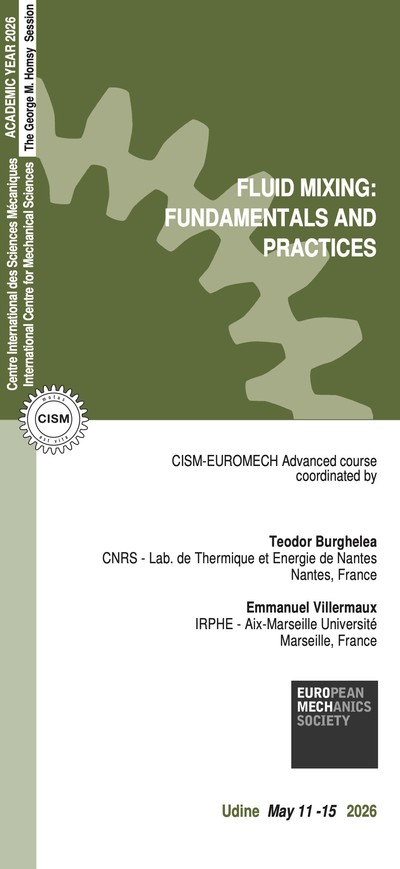The increased sophistication of materials (e.g., composites, 3D printed microstructures) and the extension of their range of use (e.g., complex triaxial state of stress induced by complex geometry) threaten to render obsolete the traditional “rules of thumb” used by designers and issued from decades of experience. Simple engineering optimization approaches are no longer applicable. Moreover, the complexity of failure scenarios makes it difficult to predict accurately the resilience of structures which is crucial when aiming at virtual testing and certification.
The solution to these difficulties lies in the ability to conduct reliable simulations at the scale of the whole structure. In this context, reliability implies to be able to use fine scale models that accurately reproduce nonlinear critical phenomena like plasticity, cracking, delamination. This in turns implies to use fine adapted meshes potentially containing billions of degrees of freedom.
Modern cluster hardware made out of thousands of multicore processors connected by a fast network makes it in theory possible to bear such a computational load. But only few solvers are capable of correctly exploiting these resources. Indeed, problems from structure mechanics possess many unfavorable features associated with the use of unstructured finite element discretization, the presence of strong heterogeneity, the history-dependent nonlinearity (elastoviscoplasticity, damage, cracking). The mechanical engineering community is deeply influenced by legacy commercial software which relies on direct solvers which, in spite of their impressive recent progress in terms of parallelism, are not able to scale up to the desired complexity.
However, domain decomposition and multigrid methods have been the object of important studies and developments in the last 30 years, and thanks to recent improvement regarding their robustness, they have reached a remarkable level of maturity. In addition to their strong mathematical foundations, these methods possess essential mechanical interpretations and offer new modeling opportunities (e.g., non-overlapping domain decomposition for the contact between subdomains, multigrid methods to handle nested models).
This course aims at presenting state-of-the-art domain decomposition and multigrid solvers for solid mechanics. The course will balance theoretical and practical aspects, as well as mathematical and mechanical points of view. The course will also discuss the open source software libraries which propose implementations of the methods.
The course is intended for graduate students working in computational structure mechanics, numerical analysis of partial differential equations, and high-performance computing. The content will also be very appealing for mechanical or civil engineers from industry seeking high performance, where the characteristic size of critical phenomena is very small compared to the structure. This framework encompasses composite structures (aerospace industry), microstructure-driven metallic parts (rolling elements in trains and cars), reinforced concrete buildings, biomedical applications...
A. Toselli and O. Widlund. 2005. Domain decomposition methods – algorithms and theory. Springer series in computational mathematics.
P. E. Farrell, M. G. Knepley, L. Mitchell, F. Wechsung. 2021. PCPATCH: Software for the Topological Construction of Multigrid Relaxation Methods. ACM Trans. Math. Softw. 47, 3, Article 25.
D. A. May, P. Sanan, K. Rupp, M. G. Knepley, B. F. Smith, 2016. Extreme-Scale Multigrid Components within PETSc.
Pavarino, L. F., Scacchi, S., Widlund, O. B., & Zampini, S. (2018). Isogeometric BDDC deluxe preconditioners for linear elasticity. Mathematical Models and Methods in Applied Sciences, 28(07), 1337–1370.
N. Spillane, V. Dolean, P. Hauret, F. Nataf, C. Pechstein, R. Scheichl. 2014. Abstract robust coarse spaces for systems of PDEs via generalized eigenproblems in the overlaps. Numerische Mathematik, 126(4).
C. Bovet, A. Parret-Fréaud, N. Spillane, P. Gosselet. Adaptive multipreconditioned FETI: scalability results and robustness assessment. Computers & Structures, 2017, 193, pp.1-20.
A. Heinlein, O. Rheinbach, and F. Röver. 2023. Parallel Scalability of Three-Level FROSch Preconditioners to 220 000 Cores using the Theta Supercomputer. SIAM J. Sci. Comput., 45(3):S173-S198.
A. Klawonn, M. Kuhn, O. Rheinbach. 2016. Adaptive coarse spaces for FETI-DP in three dimensions. SIAM Journal on Scientific Computing 38 (5), A2880-A2911
V. Rey, C. Rey, P. Gosselet. 2014. A strict error bound with separated contributions of the discretization and of the iterative solver in non-overlapping domain decomposition methods. 2014. Computer Meth, in App, Mech, and Engng. 270, 293-303.
6 lectures on: Mechanical introduction to non-overlapping domain decomposition methods, discussion about classical preconditioning and coarse space, extension to nonlinear problems (in particular elastoviscoplasticity), link with verification and error estimation, global/local coupling and asynchronous computing, illustration on simplified examples from aeronautic applications.
5 lectures on: Introduction to nonoverlapping DDM using Lagrange multipliers; additional constraints for parallel scalability; theoretical considerations and condition number estimates; heterogeneous problems and adaptive coarse spaces; nonlinear domain decomposition methods; nonlinear elimination; domain decomposition and machine learning; application to problems in solid mechanics.
6 lectures on: Multigrid methods, including robust smoothers for operators with large kernels, parallel considerations, performance analysis, and monolithic multigrid for systems of equations; multilevel nonlinear preconditioning; applications to geodynamics.
5 lectures on: Introduction to overlapping domain decomposition methods (DDM) with exotic coarse spaces; theory of overlapping DDM with GDSW and related coarse spaces; improving the range of scalability by additional levels; nonlinear overlapping DDM; the open source FROSch framework as part of the Trilinos software library and application of FROSch to problems in chemo-mechanics.
5 lectures on: Krylov subspace methods for solving linear systems (conjugate gradient, GMRES…), acceleration by preconditioning and deflation, convergence theory, abstract presentation of domain decomposition methods (emphasis on Additive Schwarz, BDD and FETI), GenEO coarse spaces for robustness and scalability, multipreconditioning, non-symmetric problems.
6 lectures on: Hands-on introduction to the PETSc library focusing on scalable multigrid solvers and parallel implementations, relation between domain decomposition and multigrid, multilevel DD solvers in PETSc, multigrid for time-dependent PDE, optimization solver for scientific machine learning.





